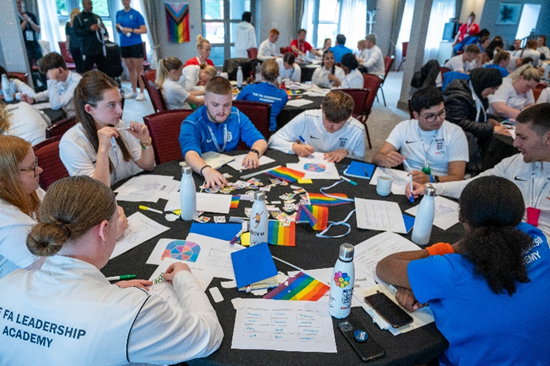As anticipation builds for the upcoming Football Vs Transphobia Week of Action in March 2024, it's essential to reflect on the transformative impact of initiatives like this spearheaded by Football Vs Homophobia. This year marks a significant milestone: the fifth season dedicated to combating transphobia and promoting trans inclusion in football. With each passing year, the collective commitment to amplifying the voices of trans individuals and allies in the football community grows stronger.

The essence of the campaign lies in its multifaceted approach. From designating games as Matches vs Transphobia to elevating trans and non-binary voices in the football sphere, the initiative seeks to create a more inclusive environment for all. It's inspiring to witness clubs, fans, and stakeholders coming together to champion this vital cause.
The recent historic moment at the Women’s World Cup 2023, where Canada midfielder Quinn became the first transgender and non-binary person to appear at either a men’s or women’s World Cup, serves as a powerful testament to the progress we've made. Quinn's journey embodies resilience and authenticity, reflecting the transformative power of sports in breaking down societal barriers. Their courage in coming out as transgender and non-binary serves as a beacon of hope for countless individuals striving to live authentically.
Quinn's journey resonates deeply with many who have faced similar challenges in the sporting world. Their courage in being their authentic self despite societal barriers inspires countless individuals. As Quinn eloquently expressed, "I wanted to be my authentic self in all spheres of my life," highlighting the universal desire for acceptance and inclusion.
Quinn became a personal role model for me, inspiring me to jump back into the sporting world which I fell in love with. Football has always been more than just a game for me. Growing up, it provided solace and a sense of belonging. However, upon coming to terms with my gender identity as a transgender man, I found myself sidelined from the footballing world. The realization that I couldn't play the game I loved due to societal barriers was disheartening. Yet, through coaching and community engagement, I discovered a renewed sense of purpose. Now I strive to push the boundaries on inclusion with Quinn and Football Vs Transphobia's Campaign.
Our Future, in the wake of the 2020 Tokyo Olympics, the International Olympic Committee (IOC) has taken significant strides to enhance access to sports worldwide. A new policy framework has been crafted, aimed at fostering inclusivity and breaking down barriers to participation. This landmark policy reflects a collective commitment to ensuring that individuals from all backgrounds have equal opportunities to engage in sports.
Behind closed doors, national governing bodies are also actively working to develop and implement new policies to promote accessibility in sports. These efforts are crucial in addressing systemic inequalities and ensuring that everyone, regardless of their socioeconomic status, gender, or ability, can participate in sports.
From grassroots initiatives to international governing bodies, the sports community is united in its pursuit of inclusivity and equity. While there is still much work to be done, these steps forward represent a significant turning point in the journey towards a more accessible and inclusive sports landscape on a global scale.
Written by Thomas Lamberth, the FA National Youth Council; Community Engagement Lead (North), Student at Manchester Metropolitan University studying Manchester City Community Football coaching, and Manchester Young Leader.


